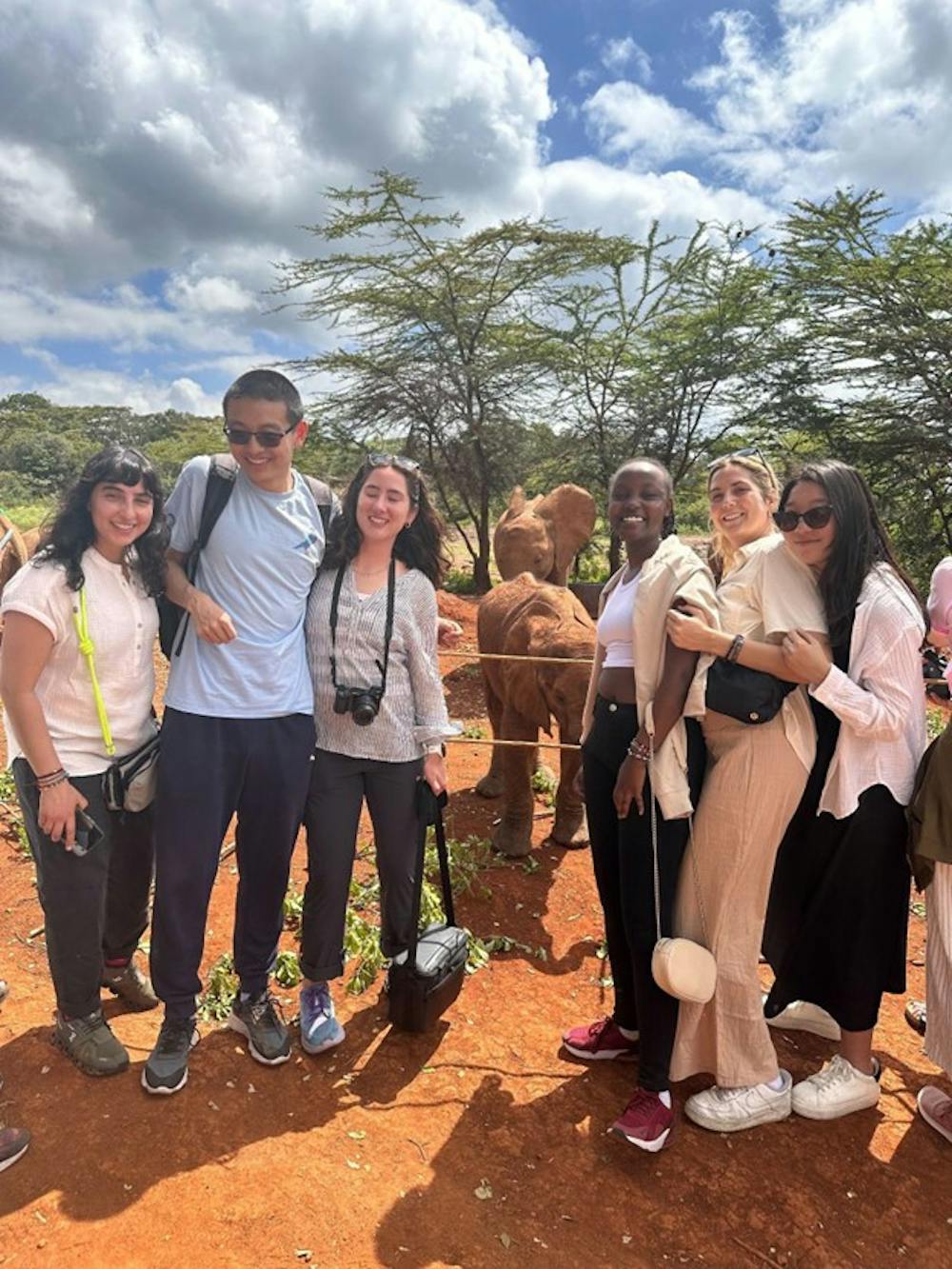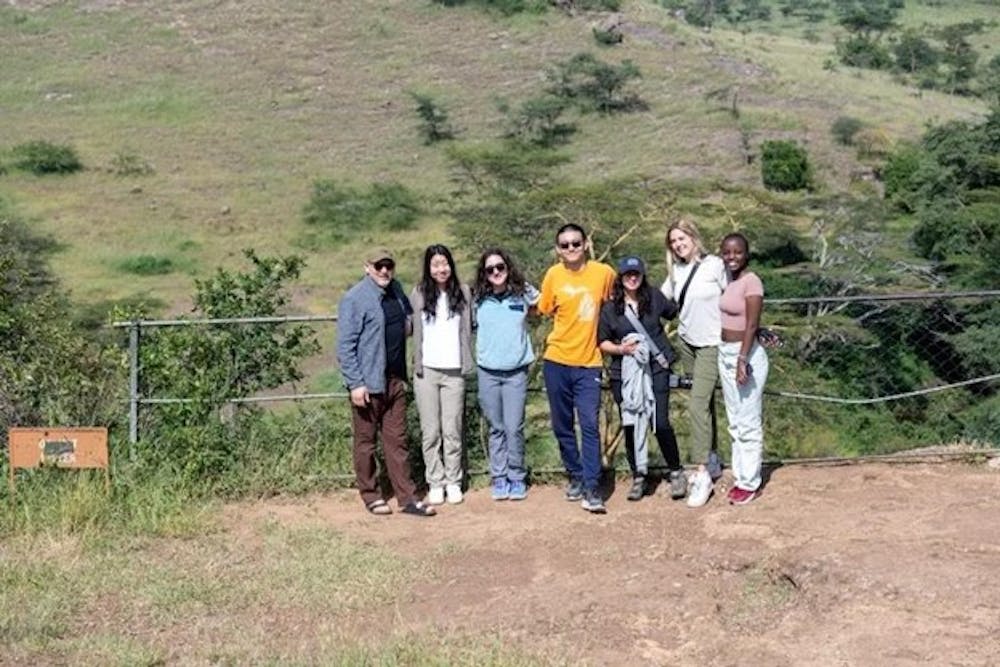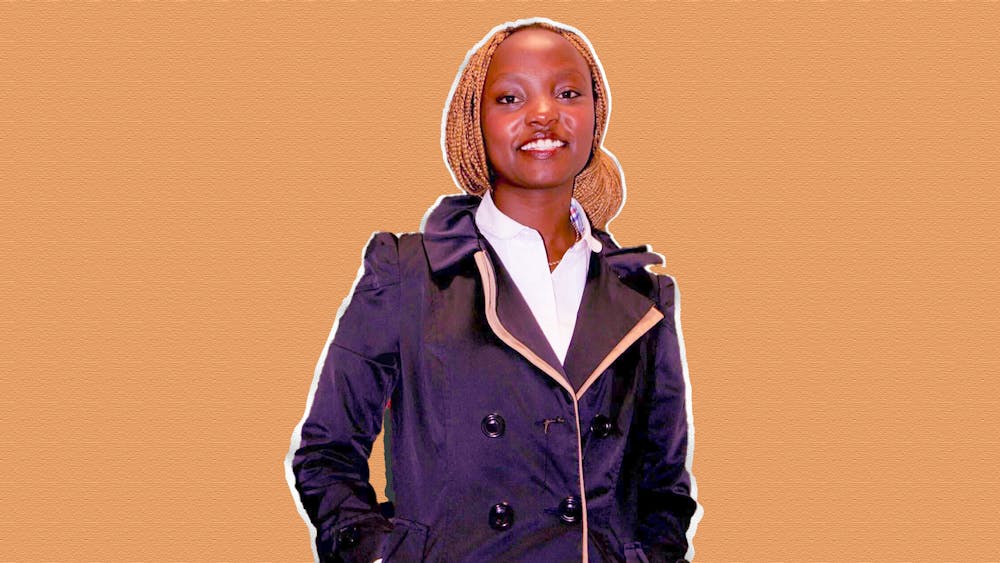When Sharon Chepnego (W '26) strolled down Locust Walk's Student Activities Council Fair at the start of her freshman year, a particular table caught her attention. Its poster contained the word “KENYA” in big, bold lettering. Sharon, an international student, had just arrived at Penn from Nairobi, Kenya, and was only beginning to get accustomed to her new life at an American university. She only recently received her SIM card from T–Mobile and had just been taught how to use Amazon.
The table belonged to the Penn Global Documentary Institute, a network of Penn students and faculty who aim to extract the stories of individuals from various communities around the globe. PGDI uses cutting–edge technology and media production to create multifaceted projects. Their works include award–winning films and books that have been included in international festivals and exhibits and featured on platforms such as Discovery+ and the United Nations Refugee Agency.
Interested in PDGI’s work, Sharon was inspired to watch some of their recent documentaries, finding a connection to the country she calls home. She found out that their upcoming project consisted of interviewing members of the Kakuma Refugee Camp and its neighboring Kalobeyei Settlement. The camp was originally established in 1992 by the UNHRC as a safe haven for the 20,000 Lost Boys of Sudan, who were displaced or orphaned during the Second Sudanese Civil War. More than three decades later, Kakuma provides humanitarian aid to over 200,000 refugees fleeing conflict, including men, women, children, and families, from several different African countries such as South Sudan, Sudan, Somalia, the Democratic Republic of the Congo, Burundi, Ethiopia, and Uganda.

As she learned about the project, Sharon was reminded of her friend from home, Stephen, whose friendship she describes with a smile that stretches from ear to ear. The two met in June 2021 through a program that helps students in Kenya apply to schools in the United States, and Stephen now studies at Stanford University. Sharon had grown up with South Sudanese children, but Stephen was her first friend to open her eyes to the situations of families from other parts of Africa.
It wasn’t until the months leading up to their move to America that she became aware of the stark contrast between her and Stephen’s lives. “I began learning about the things he can’t do,” she recounts. When Sharon asked him to accompany her on a simple errand to open a bank account, she learned that, without citizenship, the process was far more difficult for him. Stephen yearned to attend university in the United States because he didn’t receive government funding for college in Kenya, which is usually a guarantee for any student who passes their Kenya Certificate of Secondary Education exams.
Inspired by her personal connection, Sharon instantly knew she wanted to contribute to the PGDI's project. She was accepted to be a part of the group, which, in collaboration with Penn Abroad, traveled to Kakuma and Kalobeyei during the summer of 2023. Reflecting on her relationship with her colleagues with a sense of admiration, she explains, “You see the dynamic of every individual bringing something different to the table.” Sharon leveraged her own background in Swahili, the lingua franca of East Africa, while learning film and camera techniques from her team. Sharon’s experience with PGDI taught her an immense amount about her own country, as a visitor in Kenya for the first time in her life.
“It’s close to me, but for the first 18 years of my life, I've never thought about the people living in Kakuma. I had never been there and if not for Penn, would probably never have gone there," Sharon admits.
Working on the documentary, she heard from the families and communities that lived right next door throughout her whole life with an entirely new perspective. Her eyes were opened to the differences between her own family and those that live in Kakuma. People suffer due to their lack of citizenship, poverty, and all of the social corruption that exists within the camp. For example, officers will arrest individuals who have done nothing wrong, and fine them with large sums of money they can barely afford. “It is a daily struggle to put food on the table,” Sharon explains. She viewed herself as somewhat privileged for the first time and grateful for all of the opportunities given to her and her family. “I started realizing the nuances that come with not being a citizen in your home. We are very homogenous in Kenya, and I, like the majority of the population, am a citizen. I never really thought about how other situations could exist,” Sharon admits. “It is scary to not be able to live in your own home.”

Despite the necessity of helping the world gain awareness of the situation in Kakuma, Sharon believes it is equally as important to shed light on the stories of hope and positivity that persist within the camp. Plenty of individuals in the camp were able to rebuild their lives and create a home amidst the struggle. Sharon lets out a laugh as she recounts one particular artistic girl her own age in the camp, who found ways to maintain her identity as an artist, dancer, and poet. “When you are talking to her, she is really sure that one way or another things are going to work out for her, even though she has no basis to believe that. I don’t think I’ve ever been so sure something is going to work out for me,” Sharon remembers, in awe of her peer's confidence and resilience.
After filming in Kenya, the documentary has since been completed and will be open for public viewing in the upcoming months. Throughout the second half of the summer, she continued to work with PGDI, invited by professor Peter Decherney, the primary faculty member of PGDI. As his research assistant, she accompanied him to Uganda on their project spotlighting the growth of Jewish communities in Africa.
While Sharon may have spent her summer studying film, her academic experiences during the school year are wide and varied. Prior to university, Sharon attended a rigorous boarding school in the Rift Valley region of Kenya, called Kenya High School, with days beginning at 4:30 a.m. and ending at 10:45 p.m., which put her at both an advantage and disadvantage when she first began Penn. The six to seven hours of sleep per night she receives now are a luxury, and the workload is manageable compared to her past school experience. However, Sharon still had to adjust to the tremendous differences in American curriculum, having never taken any AP courses and growing up in an educational system primarily influenced by the United Kingdom. When considering universities in America, she was initially attracted to Penn’s seven–year bio–dental program, but ultimately applied as undecided in the College of Arts and Sciences.
Having been used to a learning routine of book to mind to exam—no more, no less—Sharon became intrigued by Penn’s courses, specifically in Wharton, which are “a lot more applicable to real–life situations and involve more collaboration.” She eventually transferred to the Wharton School, and notes that she would have never had the chance to take a finance class in Kenya. Her academic endeavors are not only limited to her major—Sharon is pursuing a minor in German as well. After college, Sharon hopes to gain some work experience in the United States or spend some time in Europe.
All of the different challenges and barriers Sharon had to face—and is still facing—in her adjustment to Penn have taught her to be gracious to herself. In school, it is so easy for students to feel overworked and burnt out, causing them to forget to self–validate and realize how far they have actually come and the amazing things they accomplished in reality.
Through her time both in Kenya and in Penn so far, Sharon’s story exemplifies the significance of perspective. Oftentimes, we must take a step back and approach issues or ideas through an entirely new lens in order to educate ourselves further and understand them holistically.

